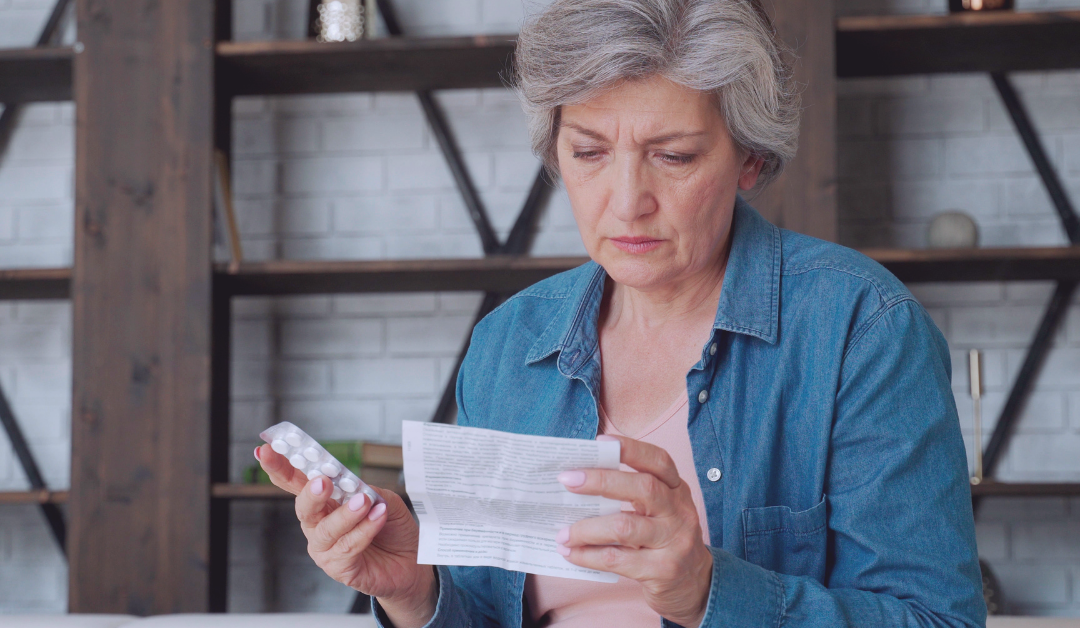One of the most important tasks of a caregiver is medication management. But for some of you reading this blog, you’re not a caregiver. Your parent may be at that stage where they can still take care of themselves, but you see them slowing down, becoming more forgetful, and maybe even a little unsteady on their feet. You’ll most likely notice these changes before anyone else because you know them better than anyone else. If you live out of state, use opportunities when you’re together in person, such as on holidays, to make an initial assessment.
Signs To Look For
Look for any visual clues that your loved one is not taking their medication. This may include full prescriptions, empty bottles, or finding pills in the trash. If you do notice any of these things, don’t panic. Instead, start by asking questions. For example, “I noticed that your prescription was empty. Did you finish the medication?” or “I found this pill in the trash. What was this for?”
Your parent may be embarrassed that they forgot to take their medication or didn’t finish it. They may also be hesitant to tell you that they’re having trouble taking care of themselves. But, by asking questions, you’re showing that you’re concerned and want to help.
A Conversation About Their Medication
If you’ve found out they stopped taking their medications; this isn’t the time to start to lecture them that they know better. You may be tempted to do this, but it will only lead to an argument, and that’s the last thing you need right now.
Instead, sit down with your parent and have a conversation. Find out what medications they’re taking, the dosage, and when they’re supposed to take them. However, even before this conversation, it’s essential to be mindful of why they may have stopped taking their medication in the first place.
Assist Seniors Who Stopped Medication
Although there are many reasons your aging loved one has become inconsistent with their medication or even stopped completely, below, you’ll find five action steps to assist.
- A senior may forget why they’re taking the medication or believe someone is trying to sabotage them. Although your instinct may be to have a logical conversation about the need to adhere to a doctor’s prescription and what could happen if they don’t, this will not ease their anxiety. Instead, acknowledge their concerns and learn why they feel the way they do.
- Take the time to ask about their regimen. Ask questions such as “Do you know what this medication does?” Also, listen if it’s expressed that a medication is causing any side effects. For example, if a drug makes them sleepy, it may be best to change their regimen, but contact their doctor before making any changes.
- Set a timer or reminder on their phone to assist your senior to take their medication at specific times. A medication calendar or chart in a visible location such as the refrigerator are also viable options.
- Use a medicine planner or pillbox to stay organized. However, as additional needs become apparent, the caregiver’s role is to ensure that the senior receives the correct medication each day. Small pills can easily bounce from one day’s compartment to another or drop on the floor.
- Call their physician to provide clarity. Ask questions such as prescription timing, and if you receive a voicemail recording, follow up to get answers. Let the doctor or nurse you’re speaking to know the importance of the call and that it could be life or death for the senior in your care.
When should a professional be involved?
If there is concern regarding the person in your care, call their doctor. Let them know whatever the issue may be, and rely on those with the education and experience. It’s important to remember that we, as caregivers and children of aging loved ones, are not expected to know everything. Ask for help.
A skilled agency can assist with a medication assessment and other assessments to help protect your loved ones.
If you’re looking for further assistance for the senior in your care, contact us at https://loveishomecare.com/contact-us/

